Hiromasa Mizushima
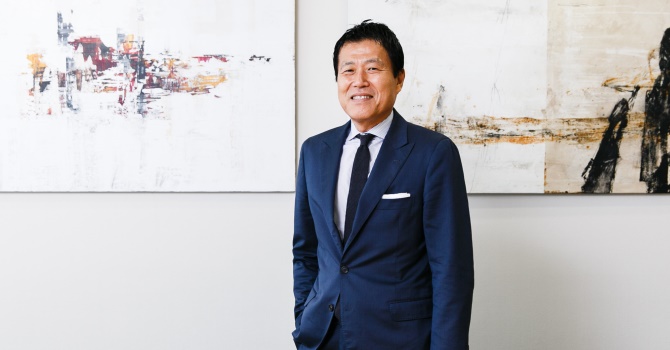
- Classification
- Equity
- Company
- Simplex Asset Management Co., Ltd. and Simplex Financial Holdings Co., Ltd.
Hiromasa Mizushima became a CEO of Simplex Asset Management Co., Ltd. in 2005. He is a member of Japan Association Corporate Executive (Committee on Management Reforms, Committee on Political and Administrative Reforms, Committee on Financial and Capital Markets, Committee on Asia-Japan Relations), of Japan Association of Corporate Directors, and of “Study Group for Reinforcing Japan’s Competitiveness”. Mizushima earned a B.A. in Finance from Waseda University in 1977. He joined Nikko Securities Co., Ltd. in 1977. He was also a founding member of Nikko Citigroup’s joint venture in 1999, and led the success of the large scale operation between Japan and the US giants. Through August 2005 he was the head of Nikko Citigroup’s equity division, responsible for global sales, trading, capital markets, derivatives and research.
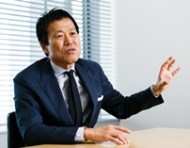
As “A stream of water runs down,” we believe that economic phenomena as well as capital markets will flow, over time, in the direction that is more logical and efficient.
With that strong belief in mind, we perform thorough analysis on all listed companies within our investment universe, narrow down and select names with embedded inefficiencies. After making investments, through a series of direct dialogue with the management team of those companies, we help them grow and accelerate out of an undervalued environment. And we do this continuously, over and over. We still see inefficiencies throughout capital markets in Japan, therefore, we manage funds with strategies in which we can establish conviction that we can contribute to accelerating the speed of amending those inefficiencies.
For a detailed investment process, I would like to refer to one of the funds we manage, the Simplex Value Up Fund (the “Fund”).
Although there are only 30 ? 40 names in the portfolio, four analysts are constantly monitoring approx. 300 names in the universe that have been selected based on financial analysis. Out of the 300 names, almost 150 names are on the watch list constantly, that means, the portfolio manager and I are periodically making contact and touching base with their management team for the purpose of a fixed-point observation. Through this step-by-step and continuous interview with the management team of the 150 companies, we make decisions in a comprehensive manner as to which will finally be invested in.
As for those 30 ? 40 names that we actually invest in, through direct dialogue held with their management team periodically, I continue thinking about various ideas to increase their corporate value. The most important point in managing the Fund is that the management teams together with the investors, like ourselves, are able to frankly discuss the corporate value eye-to-eye, and moreover, by sharing a common sense of value, we mutually build up a relationship of trust.
Another critical factor in managing the Fund is know-how in trading skills. Most of the names in the Fund’s investment universe tend to have rather low liquidity (less trading volume than average). When buy orders are placed at the market, our own buy orders could push up the price of the relevant equities, resulting in higher than expected execution price. In order to avoid this, we use some trading tactics, such as “block-trades”, to try and minimize the impact on market price.
Also, since the strategy targets highly concentrated investments, we are cautious about monitoring the manageable size of the Fund. Under the current market environment, the maximum size for the strategy is approx. 100 billion JPY. When it nears the limit, applications for subsequent subscription will not be accepted (currently, no additional subscription applications are accepted). We strive to create funds with strategies that we believe does not only perform well, but also effective and workable at any point of time.

There are almost 3,500 listed companies in Japan.
However, the ones under constant analysis by analysts of both sell-side and buy-side together are less than 1,000 companies; this is the fact. That means, currently, more than two-thirds (2/3) of listed companies are under researched. This fact simply backs up the statement I often make, “The Japanese market is a gold mine.” Relatively smaller-cap companies, due to the issue of liquidity, are left under-research by most of the analysts in big firms, which consequently often leaves them in the market comparatively cheap despite their actual value.
In Japan, other than Tokyo Stock Exchange, there are locally operated stock exchanges such as the Nagoya, Fukuoka and Sapporo exchanges. In addition, even at Tokyo Stock Exchange, there are several segments, such as the main market (the first and the second section), Mothers, JASDAQ and TOKYO PRO Market (furthermore, there are segments at the locally-operated exchanges). This makes it difficult for investors to compare values of listed companies across different exchanges on the same scale, creating comparatively cheap equities in the local markets.
Other than that, a unique characteristic of the markets in Japan is “dual-listing” (where both holding companies and subsidiaries are listed), also creating a unique investment opportunity for undervalued stocks.
As I said earlier, “A stream of water runs down.” Abnormal conditions will be corrected over time toward a more logical and fair direction. We strongly believe that the Japanese market is one of the few markets in developed countries where value investment strategies can work effectively.
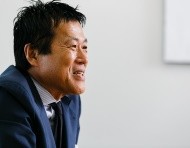
I started my career at SMBC Nikko Securities (formerly, “Nikko Securities”). My last responsibility at Nikko was the Head of Equity Division; if I had stayed on there, I would have ended up having the same view and understanding of capital markets in Japan as that of the leading securities houses. However, having had a lot of opportunities to interact with investors and oversease business partners, I had come to think that what we thought as “common and ordinary” was often not the case for foreigners.
In Japan, it is quite normal and standard for asset management companies to be an affiliate of a huge financial conglomerate that consists of banks, insurance companies and securities houses. Because of this, the primary purpose of an asset mangement company is to create products that are easy to sell to the mass market through the distribution channel of their group companies. However, it is quite rare for asset management companies overseas to be an affiliate of a big financial group. In contrast, there are many asset management companies that are independent doing business globally. Their vision is very simple; “A good product always attracts those who understand its value.”
When I often wondered about the uniqueness in the Japanese asset management industry, I had heard that some members of the proprietary trading desk at the former Salomon Brothers Tokyo (Salomon Brothers Asia Limited) were working on starting up a hedge fund. ?That hit me and I talked to the management team of Nikko in order to support and back up such an independent asset manager in Japan. I had made it happen and that hedge fund is Simplex Asset Management. Having helped Simplex start-up its business, I left Nikko and worked as the head of Japanese equities division for 7 years at Citigroup.
Through my career at both a Japanese and international securities companies, I had learned capital markets as the head of the equity division within securities firms. Then, I developed a desire to change the capital markets in Japan not based on the theory of the sell-side business players but simply as one investor. And finally, that ambition became so big that I decided to leave the securities firm which I had worked in thoroughout my career.
I bought Simplex via MBO in order to make my dream come true, which is to make Simplex an Asia-based independent asset manager in Japan with a product-oriented mind, putting investors’ interests ahead of everything else.
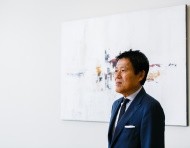
Of course, I am keen on making profits and performing well, however, I am also very cautious about making decisions not on my assumptions only. I periodically review and ponder my own thoughts and listen to other people’s opinion. After making investments, we keep close relationships with the management of the invested companies and try to hold direct dialogue with them periodically, lest we overlook a subtle change that may occur.

We are very sensitive about how we protect clients’ assets as well as how to ensure transparency. First, it is crucial to continuously maintain a reliable platform that offers rigid compliance and advanced risk management. We also utilize external review and monitoring effectively. In general, all funds under our management are subject to the annual audit performed by an external auditor. In addition, although Simplex itself has been audited by an external auditor since inception, in order to maintain more rigorous transparencies, our holding company has been listed on the TOKYO PRO Market since January of this year. Also, in July 2013, we acquired the Statement on Standards for Attestation Engagements (SSAE) No. 16, Reporting on Controls at a Service Organization (known as “SSAE16”) and it has been updated annually.
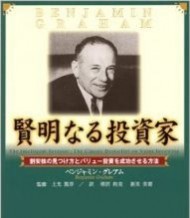
“The Intelligent Investor” by Benjamin Graham.
The book was written more than 60 years ago (first published in 1949) and is a widely acclaimed book for value investing by Benjamin Graham, whom is viewed as the mentor of Warren Buffet.
The heart of Graham’s argument is that the intelligent investor must never invest based on forecasting the future earnings and market condition. The book talks about the key to the typical framework for value investing, that is to choose investments by way of a thorough analysis on the past and current business’s assets, liabilities and earnings.
It is a very old book but it talks about the fundamental of value investing and yet is freshly referenced to in today’s market. It has become a bible for me.

I read the Nikkei newspaper every day, but I also refer to news broadcasted by overseas media such as the Financial Times, CNN and CNBC, etc. lest my way of thinking will be domestic-biased.
Notes:
This article originally appeared on September 18, 2015. Any views presented in this article are as of such date and are subject to change.
This article and the information provided therein are not a recommendation to purchase or sell any security, nor are they intended to constitute the marketing of, or a solicitation for investment in, any investment product.
Simplex Asset Management Co., Ltd. is a leading and independent hedge fund and investment management firm in Japan. We provide a range of services to a substantial and diversified client base that includes financial institutions, corporations and high-net-worth individuals globally.
Simplex Asset Management Co., Ltd. was founded in 1999 and adapted to a holding company structure in 2006 by establishment of Simplex Financial Holdings Co., Ltd. with Simplex Asset Management Co., Ltd. being its core business.
Our primary goal is to provide superior returns to our clients. The professional quality and responsibility of our work is of great importance to us and we are very determined to achieve excellence in everything we undertake on behalf of our clients.
Our assets are our people and we make an unusual effort to identify and recruit the very best person for every job. Excellent professionals with domestic and global experience work at Simplex Asset Management Co., Ltd. and help our clients achieve their investment goals.
Maximizing our clients’ return and earning their trust is critical, while applying cutting edge financial skills, strict compliance and sophisticated risk management capabilities.
・Equity Strategies
Value Up Strategy
The "Value Up Strategy" invests in listed stocks of small and medium size companies. The investment style is focused on finding companies with management willing to unlock shareholder value, through operational and financial engineering. The strategy is to actively persuade management to implement shareholder friendly actions while maintaining a constructive relationship.
Net Cash Strategy
The "Net Cash Strategy" is focused on companies with net cash values. Typically these companies are established businesses well positioned to compete in their market niche, with a long history of generating stable free cash flows. Our goal is to identify companies with mispriced securities and to apply our analytical skills to provide us with valuable insides, such as stability of cash flow and growth potential to ultimately have the stock price converge to its fair value.
Oyako Strategy
This strategy takes advantage of mispriced shares of companies with dual listings of a parent and its subsidiary. The Oyako Strategy primarily holds long positions in an undervalued subsidiary while taking a short position in the overvalued parent company.
・Fixed Income Strategy
Global Equinox Macro Strategy
The Global Equinox Macro strategy is a global macro strategy to seek for absolute returns by investing in multi assets focusing on the attractive sets of fixed income securities and currency sets, and to aim for optimal returns in various interest rate cycles. The investment universe includes investment grade government and corporate sectors, emerging securities, high yields, their futures, CDS, and etc. The portfolio also diversifies in regions and rotates among sectors by relative attractiveness of the combinations. Non-fixed income asset mix (e.g. equity indices) is used as a sub sector, and is opportunistically selected to enhance the hedges among sectors in order to achieve optimal returns.
・ETF
We have a strong pipeline of attractive and new types of ETF's which will further help to diversify the Japanese ETF markets.
・Others
Asia Equity Opportunities Strategy
This strategy focuses on macro events, relative value as well as structural imbalance in supply and demand. The investment universe is mainly consisted of liquid Asian indices and options.

September 18, 2015
by Investment in Japan

